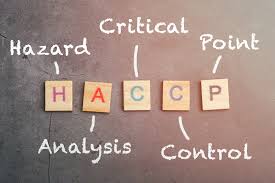HACCP Certification: Ensuring Food Safety and Quality Control
HACCP (Hazard Analysis and Critical Control Points) is a globally recognized methodology for managing food safety risks. The HACCP certification is vital for organizations involved in the production, processing, handling, and distribution of food products, as it helps identify, evaluate, and control hazards that could compromise food safety.
This article explores the importance of HACCP certification, the certification process, industries that benefit, and the advantages of implementing HACCP principles.
1. Importance of HACCP Certification
The safety of food is a global priority, and HACCP certification plays a critical role in safeguarding public health by preventing foodborne illnesses. Key reasons why HACCP certification is essential include:
- Consumer Protection: HACCP ensures that food products are safe for consumption by identifying and mitigating biological, chemical, and physical hazards.
- Compliance with Regulations: Many countries and regions mandate HACCP compliance for food businesses. Certification ensures adherence to local and international food safety regulations.
- Market Access: HACCP certification enables businesses to meet the requirements of international markets, boosting export opportunities.
- Preventive Approach: Unlike traditional methods that focus on end-product testing, HACCP emphasizes preventing hazards throughout the food production process.
HACCP certification demonstrates an organization’s commitment to food safety and builds trust with consumers and stakeholders.
2. The HACCP Certification Process
Achieving HACCP certification requires a systematic approach to implementing its principles and ensuring compliance with food safety standards. The certification process involves the following steps:
- Preliminary Assessment: Conducting an initial evaluation to identify existing food safety practices and gaps in compliance with HACCP principles.
- Developing a HACCP Plan: Establishing a comprehensive plan based on the seven principles of HACCP:
- Hazard Analysis: Identifying potential food safety hazards at each stage of production.
- Critical Control Points (CCPs): Determining points where controls can be applied to prevent or eliminate hazards.
- Critical Limits: Setting acceptable limits for each CCP to ensure safety.
- Monitoring Procedures: Establishing methods to monitor CCPs and ensure critical limits are met.
- Corrective Actions: Defining actions to be taken when monitoring indicates a deviation from critical limits.
- Verification Procedures: Ensuring the HACCP system is working effectively through regular audits and reviews.
- Record-Keeping and Documentation: Maintaining records of all HACCP-related activities for traceability and compliance.
- Implementation: Training employees on HACCP principles and integrating the plan into daily operations.
- Internal Audit: Conducting a thorough review of the HACCP system to ensure readiness for certification.
- Certification Audit: Engaging an accredited certification body to assess the implementation and effectiveness of the HACCP plan.
- Certification Issuance: Upon successful completion of the audit, the organization is awarded HACCP certification.Regular surveillance audits and reviews are necessary to maintain certification and ensure ongoing compliance.
Conclusion
HACCP certification is a vital tool for organizations committed to ensuring food safety and quality. By implementing its principles, businesses can proactively identify and manage hazards, comply with regulations, and meet the expectations of customers and stakeholders.
Deniel Julian Details
User Profile
- Full name
- Deniel Julian
- Email address
- denieljulian79@gmail.com
- Join Date
- 2025-05-17
- State
- City
- Pincode
- Address
- Follow us on Facebook
- Follow us on Twitter
- Website Name
- Bio

